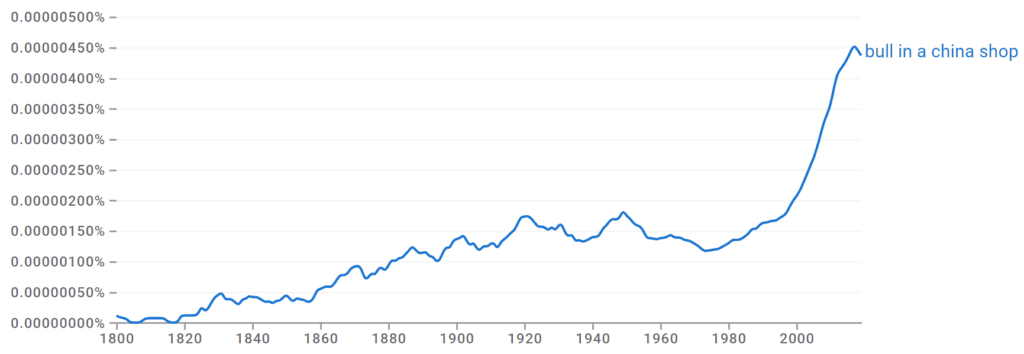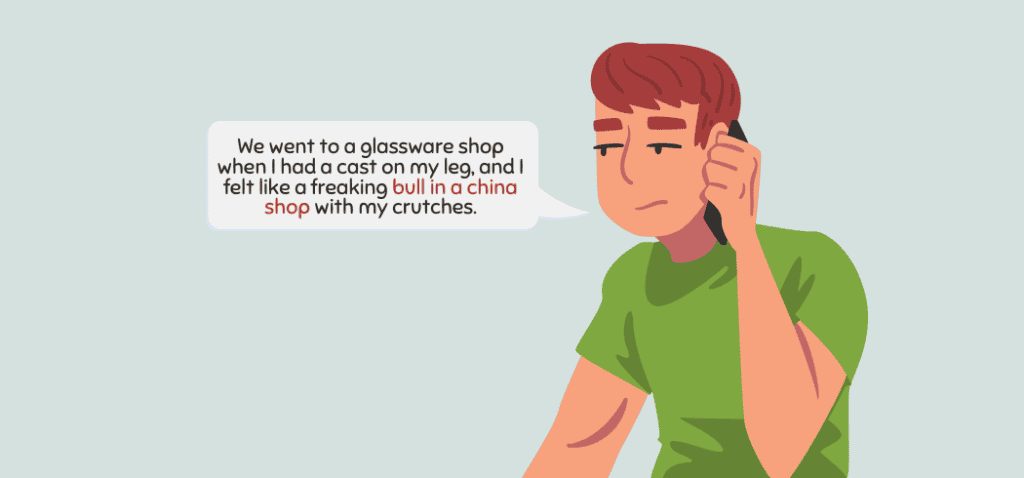Ever heard of the phrase a bull in a china shop? It sounds pretty chaotic, doesn’t it? But what does it truly mean? It can’t possibly have a literal meaning. I’ll explain where it came from and how it’s meant to be used as an idiom in this super quick guide!
Is It Bowl in a China Shop or Bull in a China Shop?
First things first, the correct phrase is a bull in a china shop, not a bowl. It’s a fun phrase that paints a vivid image of potential disaster in any situation.
Unveiling the Meaning of Bull in a China Shop
When someone is likened to a bull in a china shop, they’re described as clumsy, awkward or disruptive in a situation or environment where delicacy is required. Imagine a bull in an actual China shop—not a pretty picture, is it?
My father is a giant, towering over six feet, with an old-fashioned build you only get from years of hard, manual labor. Let’s just say graceful isn’t a word you’d use to describe him. We’ve always said he was like a bull in a china shop, especially when he’d try and help me with crafts and things as a kid.
Is Bull in a China Shop a Metaphor or an Idiom?
This is kind of a tricky question because a bull in a china shop is classed as an idiom. Idioms are phrases with figurative meanings different from their literal meanings. But metaphors are figures of speech that directly equate two things for rhetorical effect. It’s a pretty fine line, but there is a difference, I swear!
Tracing the Origin and Etymology of Bull in a China Shop
This phrase came about in the early 19th century. The earliest written reference can be found in Frederick Marryat’s naval novel, Jacob Faithful, published in 1834.
Synonyms for Bull in a China Shop
Use any of these alternatives to a bull in a china shop to add some variety to your vocab.
- Big mitts
- Clumsy oaf
- Bumbling around
- Ham-fisted
- Lumbering about
- Has two left feet
Using Bull in a China Shop in Sentences
See how you can add a bull in a china shop to your conversations with my sentence examples.
- With his boisterous nature, John always felt like a proverbial bull in a china shop at art galleries and museums.
- Marcy tiptoed around the delicate issue, determined not to be a total bull in a china shop and say the wrong thing like she usually did.
- New to yoga, Dane felt like a bull in a china shop during his first few classes as he failed to show any sort of grace.
- My friend took me to a glassware shop when I had a cast on my leg, and I felt like a freaking bull in a china shop with my crutches.
Elle Reid, a tart-tongued septuagenarian author who charges through life like a bull in a china shop, is the sort of character Lily Tomlin might have created decades ago and added to her repertoire alongside Ernestine the indiscreet telephone operator and Edith Ann, the philosophical 5-year-old in her oversized rocking chair. (Variety)
Wrapping Up With a Bull in a China Shop
There you go! That’s all the deets on the phrase a bull in a china shop. Isn’t it amazing how language can paint such vivid pictures? And remember, this idiomatic phrase can be used for just about any instance where someone or something is too harsh for a delicate situation.



